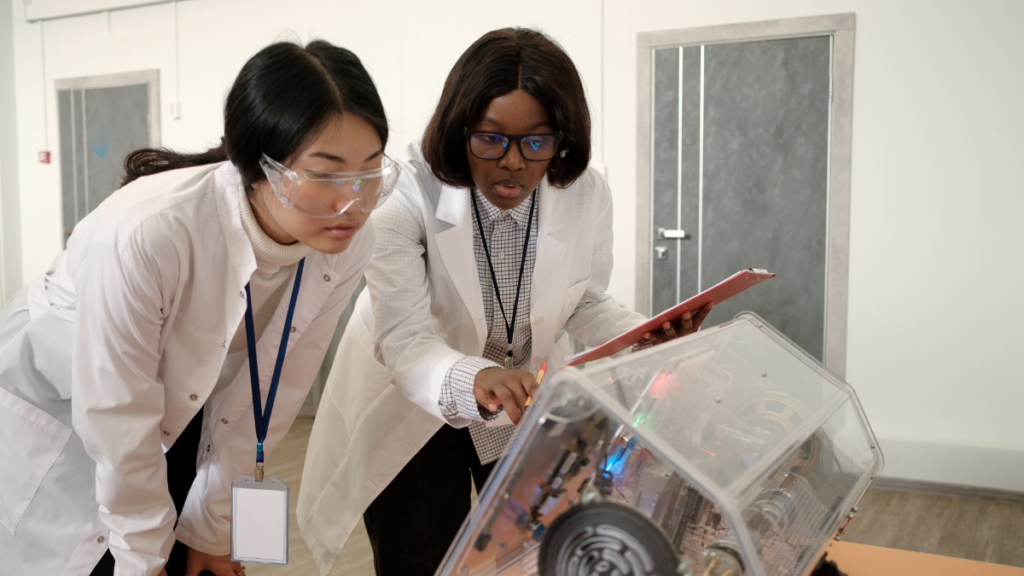It usually starts with something simple.
A friend swears their brain works better after skipping breakfast. Someone else tells you cold showers changed their life. You try it. Then you start tracking your sleep. Then you wonder if your supplements are doing anything at all.
Before you know it, you’re knee-deep in research about nootropics, continuous glucose monitors, or how light exposure messes with your melatonin. You’re not a doctor. You’re just curious—and that curiosity? It’s contagious.
This is how biohacking spreads. Not as a grand movement, but as quiet experiments in kitchens, garages, and notebooks. Not with a manifesto, but with a feeling: I think I can feel better than this.
Somewhere along the way, these scattered personal experiments started forming a pattern—one that’s beginning to tug at the edges of the healthcare industry itself.
Because when enough people start testing ideas outside the clinic, someone eventually builds tools to support them. And when those tools work? They don’t stay fringe for long.
Hacking the body wasn’t always a trend—it was survival
Long before the word biohacking showed up in a TED Talk, humans were tweaking the way they lived just to make it through the week.
Early hunters figured out which roots calmed pain. Farmers rose and slept with the sun to keep their rhythms in check. Communities passed down rituals for fasting, healing, and breathing—not because it was fashionable, but because they noticed what worked.
There was no data dashboard. No wearable buzzed on your wrist. Just trial, error, and intuition.
That’s the part people forget when they hear “biohacking” and think of Silicon Valley guys in cryo chambers. The real story is older—and more human. It’s about people paying attention to how their bodies respond to the world and trying to do better with what they have.
Even today, many of the so-called “new” hacks aren’t new at all. Cold exposure? Ancient. Intermittent fasting? Built into religious and cultural practices for centuries. We’ve been hacking our biology all along—only now, we’re giving it a name, and sometimes, a price tag.
But the instinct? That hasn’t changed. It’s still about surviving a little better than yesterday.
From Reddit threads to billion-dollar labs
It used to be a niche corner of the internet.
Someone would post their morning routine. Another would share blood test results after cutting out sugar. Strangers exchanged data points like trading cards—tracking, testing, adjusting, sharing what worked and what didn’t.
There was no official rulebook. Just people curious enough to run the experiment on themselves first.
Eventually, the conversations moved beyond forums. Podcasts, YouTube channels, and DIY blogs turned into communities. People weren’t just talking about their habits anymore—they were building tools, apps, supplements, even companies.
Investors noticed. Suddenly, the same ideas once buried in message boards were being repackaged into startups. Wearables that monitor stress. Rings that track sleep cycles. Personalized nutrition plans based on your DNA.
What started as scattered self-experimentation had built its own economy. But the mindset didn’t change—it was still about listening to the body and trying to understand it better.
Only now, the world was listening too.
Why healthtech is finally paying attention
For years, medicine treated the patient journey as something reactive. You feel off. You book a visit. You wait. Then you get a name for what’s wrong.
But outside the clinic, something else was happening.
People didn’t want to wait until things broke down. They wanted to know why they felt tired after lunch. Why their focus dipped mid-morning. Why they slept for eight hours and still woke up groggy.
So they started asking their own questions—and tracking the answers.
Healthtech companies started watching. Not just the demand for wellness, but how personalized it had become. It wasn’t about general advice anymore. It was about what your body needs, right now, in real time.
That’s where tools like continuous glucose monitors for non-diabetics came in. Not as medical devices, but as curiosity tools. The same goes for smart rings, gut tests, and brain-training apps. These weren’t replacements for doctors. They were the new notebooks—ways to collect your own data and act on it without waiting for a problem.
And as more people took that approach, healthtech had to respond. What used to be fringe is now shaping product design, funding decisions, and research priorities.
Because when enough people start managing their own wellness, the system has no choice but to catch up.
The shift from patient to participant

There’s a quiet difference between being treated and being involved.
Traditional healthcare puts you on the receiving end. You show up, describe your symptoms, and follow instructions. It’s a process built around problems—what’s wrong, how to fix it, and when to check back in.
But biohackers flipped that script. They didn’t wait for a diagnosis. They started with a question: What happens if I change this?
Maybe it was cutting out late-night screens. Maybe it was tracking caffeine or testing a magnesium supplement. Whatever it was, they weren’t waiting for permission to care about their health. They were already doing it.
And that shift—from passive to proactive—is what’s rippling through healthtech right now.
It’s changing how people think about aging, performance, focus, fertility, sleep. Not as things to react to, but as areas they can tune, test, and take ownership of.
Once you realize you can influence how your body feels and functions, the old way of waiting doesn’t sit right anymore.
It’s not about being a biohacker with a capital B. It’s about participating in your own health story instead of being a footnote in someone else’s chart.
Ethics, risks, and the unregulated frontier
The freedom to experiment comes with its own kind of danger.
For every thoughtful self-tracker or mindful optimizer, there’s someone jumping headfirst into protocols they barely understand—stacking supplements, mimicking complex regimens, chasing quick results.
There’s no shortage of advice. Some of it’s thoughtful. Some of it’s reckless. And once it spreads, it’s hard to put the brakes on.
Biohacking exists in a gray zone. Not quite medicine, not quite wellness. That makes it fertile ground for innovation—and also a magnet for misinformation. The same platforms that helped build the community can also amplify half-truths and hype.
And then there’s the issue of access.
Some of the most effective tools—like full-body scans, custom labs, or high-end wearables—are still priced like luxury goods. When health experiments start to look like status symbols, it raises a hard question: Who gets to participate in this future?
It’s not that self-experimentation is bad. It’s that without guardrails, some people get burned. Others get left behind.
And that’s where the conversation needs to grow up.
Why the healthtech revolution needs biohackers
Every big shift needs people who are willing to go first.
Biohackers aren’t waiting for a study to be published. They’re testing what that study might look like—one person, one variable, one experiment at a time.
They don’t always get it right. But their willingness to try, to track, to share—that’s what turns fringe ideas into real-world applications.
Think of where we’d be without them. Would continuous glucose monitors be marketed to the general public? Would breath trackers or sleep optimization tools have gotten traction? Probably—but much slower, and with a lot more red tape.
These early adopters do more than push the envelope. They pressure-test ideas. They bring real-time feedback. They create demand for smarter tools, simpler explanations, and more human-centered design.
And they ask better questions—the kind that don’t fit inside a traditional medical intake form.
So while they may look like outliers now, biohackers are often the reason mainstream solutions exist at all. They build the road the rest of us eventually walk on.
It starts with curiosity
Most people don’t wake up one day and decide to biohack their life.
It starts small. A question. A symptom. A gut feeling that something could be better.
Maybe it’s feeling foggy after lunch. Or waking up tired for the third week in a row. Maybe it’s just wanting more control in a world where so much of health feels out of reach.
That’s the heart of this movement. Not the gadgets or the glossy terms—but the quiet act of paying attention.
You don’t need a PhD or a stack of wearable tech to start. You just need to notice, adjust, and ask what’s possible.
Because when enough people do that—when enough people start taking their health into their own hands—it sends a signal.
And that signal is already reshaping what healthtech looks like, how it’s built, and who it’s built for.




